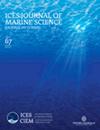Limited interspecific gene flow in the evolutionary history of the icefish genus Chionodraco
IF 3.4
2区 农林科学
Q1 FISHERIES
引用次数: 0
Abstract
Hybridization and introgression are recognized as mechanisms promoting genetic variability during evolutionary radiations. We examined the impact of introgression in the process of speciation, focusing on the Antarctic icefish genus Chionodraco. Our analyses confirmed that the three Chionodraco species (Chionodraco hamatus, Chionodraco myersi, and Chionodraco rastrospinosus) were genetically distinctive, despite signals of past interspecific gene flow between C. hamatus and C. myersi that likely occurred during interglacial periods. However, in this study, no recent hybrids were identified. The lack of contemporary hybridization may be due to life-history traits and the type of marker used in the analysis. Our study emphasizes the importance of genomic approaches to detect subtle patterns of past hybridization accurately and highlights the significance of historical climate events in the demographic and evolutionary history of Antarctic notothenioids. Polar regions, and especially the Antarctic Peninsula, are now experiencing the fastest climate changes due to global warming. Understanding the impact of past climate events is fundamental to trace current modifications in species’ genetic variability and distributions and predict future evolutionary trajectories. This knowledge is also vital for conservation efforts, including the implementation of marine protected areas.冰鱼属 Chionodraco 进化史中有限的种间基因流动
杂交和引种被认为是进化辐射过程中促进遗传变异的机制。我们以南极冰鱼属 Chionodraco 为重点,研究了引种在物种演化过程中的影响。我们的分析证实,尽管过去在 C. hamatus 和 C. myersi 之间可能发生过种间基因流动,但三个 Chionodraco 种(Chionodraco hamatus、Chionodraco myersi 和 Chionodraco rastrospinosus)在基因上是独特的。然而,在这项研究中,没有发现最近的杂交种。缺乏当代杂交可能是由于生活史特征和分析中使用的标记类型造成的。我们的研究强调了基因组学方法在准确检测过去杂交的微妙模式方面的重要性,并突出了历史气候事件在南极蝾螈的人口和进化史中的重要意义。由于全球变暖,极地地区尤其是南极半岛目前正经历着最快的气候变化。了解过去气候事件的影响对于追踪当前物种遗传变异和分布的变化以及预测未来的进化轨迹至关重要。这些知识对于保护工作也至关重要,包括实施海洋保护区。
本文章由计算机程序翻译,如有差异,请以英文原文为准。
求助全文
约1分钟内获得全文
求助全文
来源期刊

ICES Journal of Marine Science
农林科学-海洋学
CiteScore
6.60
自引率
12.10%
发文量
207
审稿时长
6-16 weeks
期刊介绍:
The ICES Journal of Marine Science publishes original articles, opinion essays (“Food for Thought”), visions for the future (“Quo Vadimus”), and critical reviews that contribute to our scientific understanding of marine systems and the impact of human activities on them. The Journal also serves as a foundation for scientific advice across the broad spectrum of management and conservation issues related to the marine environment. Oceanography (e.g. productivity-determining processes), marine habitats, living resources, and related topics constitute the key elements of papers considered for publication. This includes economic, social, and public administration studies to the extent that they are directly related to management of the seas and are of general interest to marine scientists. Integrated studies that bridge gaps between traditional disciplines are particularly welcome.
 求助内容:
求助内容: 应助结果提醒方式:
应助结果提醒方式:


